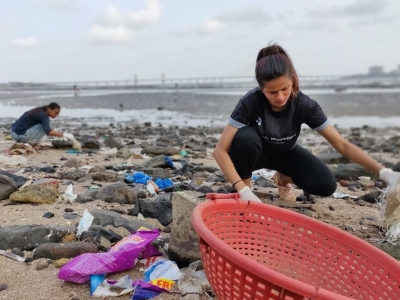BY VISHAL GULATINairobi, March 3 : A series of regional conventions and policies are playing an essential role in monitoring climate change and preparing for extreme weather events, preventing oil spills, reducing plastic and other waste, saving coral reefs, and providing overall ocean protection and restoration of marine ecosystems.
These are the key findings of a UN Environment Programme (UNEP) report, whose authors call for expanding the scope of collaboration on regional seas in the coming decade.
The report — Contributions of Regional Seas Conventions and Action Plans to a Healthy Ocean — draws on a series of case studies which examine the cumulative impact of these conventions and policies over the past 45 years.
Through a robust body of evidence, the UN-led Regional Seas Programme — which produced the report — convenes and coordinates countries and institutions, and undertakes ecosystem-based planning and management to progress towards a healthy ocean and healthy people.
The Regional Seas Programme aims to bring all relevant stakeholders together to address the accelerating degradation of the world’s oceans and coastal areas through a “shared seas” approach.Since its establishment in 1974, 146 countries have joined 18 Regional Seas.
Through cultivating joint scientific research, policy development and implementation, this network of regional policies has become one of the cornerstones of protection, conservation, and restoration of marine and coastal environments, it said.
Susan Gardner, Director of UNEP’s Ecosystems Division, said: “Marine pollution, invasive species and natural habitat loss, excessive extraction, and ocean acidification all share one common trait: they do not respect national borders.
“Regional Seas demonstrate what can be achieved by working together for common goals at a regional scale.To secure the livelihoods of over three billion people, Regional Seas must not only be recognised, but their mandate ought to be expanded.”
Activities across regions are organised through Regional Action Plans for data collection and sharing best practices, addressing capacity needs (including of women, youth and indigenous peoples), mobilising financial and technical resources to support research and implementation, as well as monitoring and evaluation of ocean conditions and policy responses.
Some of the impacts of Regional Seas are in marine pollution, biodiversity protection, and scientific knowledge-sharing.
As many as 21 legally binding agreements relating to marine pollution have been adopted.These have, for example, increased preparedness to combat oil pollution incidents and spills in the Caspian Sea and the South Asia Cooperative Environment Programme (SACEP) has successfully mitigated the impacts of an oil tanker collision outside of Kamarajar Port in India in 2017.
The 2013 Barcelona Convention for the Mediterranean has dramatically improved marine litter management across 10 Mediterranean countries, contributing to a 39 per cent reduction in beach marine litter and seafloor macro-litter from 2016 to 2019.
In the Pacific, the Pacific Regional Environment Programme (SPREP) Elsewhere, Regional Seas have been integral to the development of early warning systems, nutrient reduction, and the adoption of the Polluter Pays principle.
Regional Seas play a pivotal role in the creation of Marine Protected Areas across the world, and the Green Fins Initiative in the East Asian Seas, the Caribbean, Red Sea and Pacific regions brings together over 600 marine tourism companies in 11 countries.
Studies show that consequently dive operators have significantly lower reef contact (and hence reef damage), the Commission for the Conservation of Antarctic Marine Living Resources (CCAMLR) has introduced legal requirements for port inspection to prevent illegally landed fish from entering trade, mapping of capture and trade hotspots and a threats assessment have been jointly undertaken in west Africa, thanks to the Abidjan Convention, and in the Southern Ocean, Illegal Unregulated Unreported activities have decreased from around 33,000 to under 1,000 tons in less than a decade.
The UNEP report called on decision makers, policymakers, researchers, and other stakeholders to enhance collaboration across all Regional Seas, including establishing formal coordination with other types of organisation such as Regional Fisheries Management Organisations, UNESCO and the International Maritime Organisation, increased awareness raising campaigns on the value of a healthy natural environment to sustainable economic development and human wellbeing.
It concludes with a call to donors, the private sector, and NGOs to recognise and prioritise Regional Seas as a solution to some of the key risks facing the oceans.
(Vishal Gulati can be contacted at [email protected])
#Regional #critical #marine #UNEP # Vishal #Vishal #Jan #Barcelona
.







